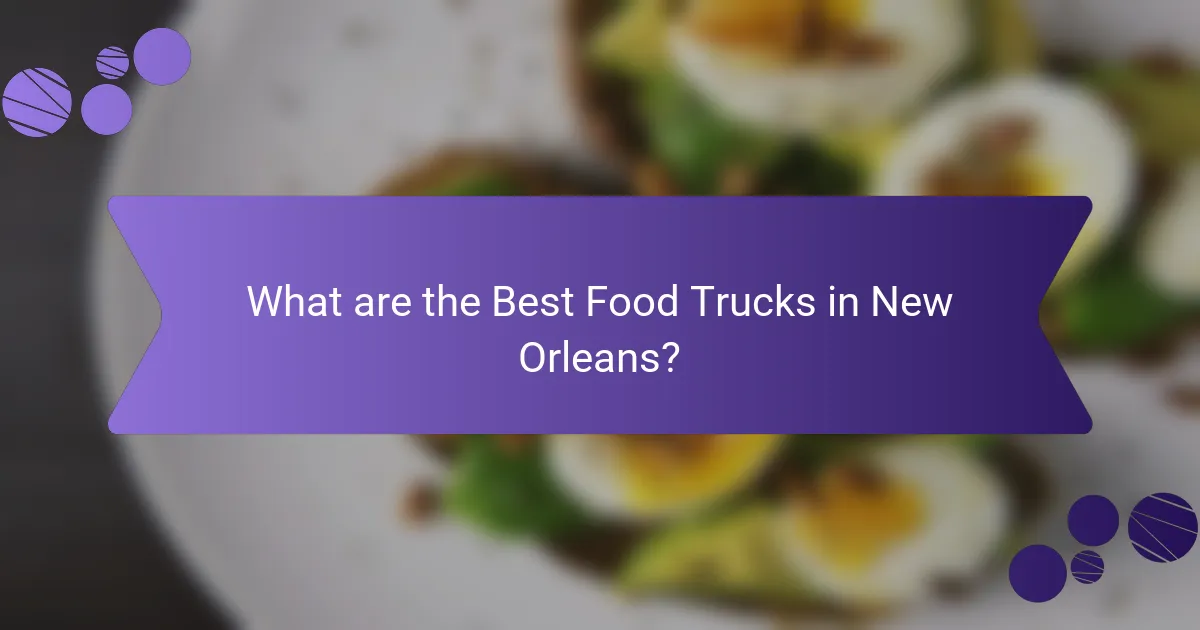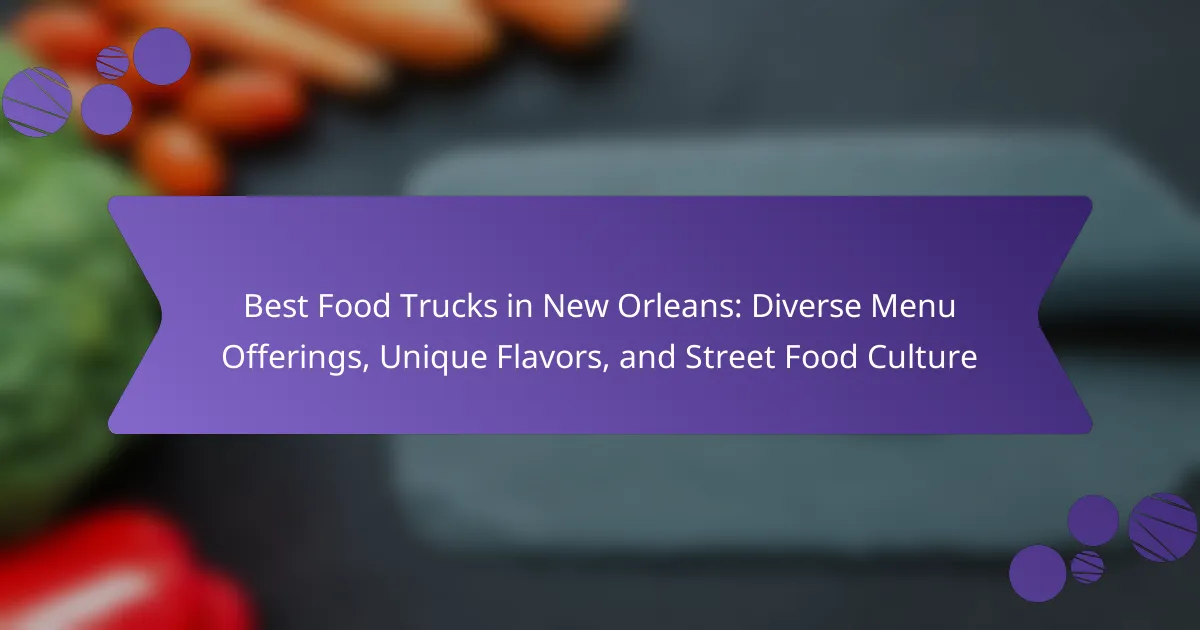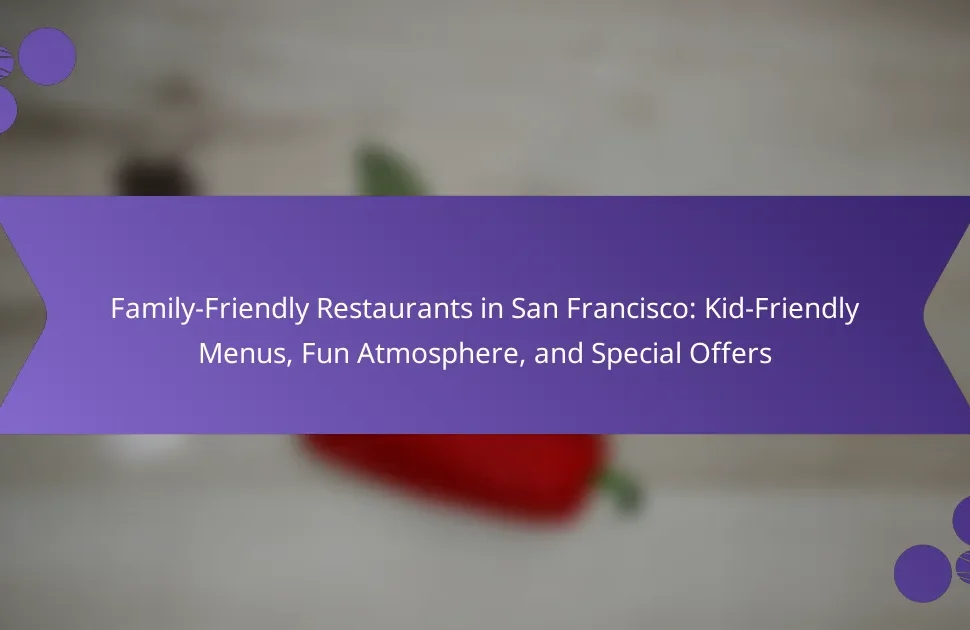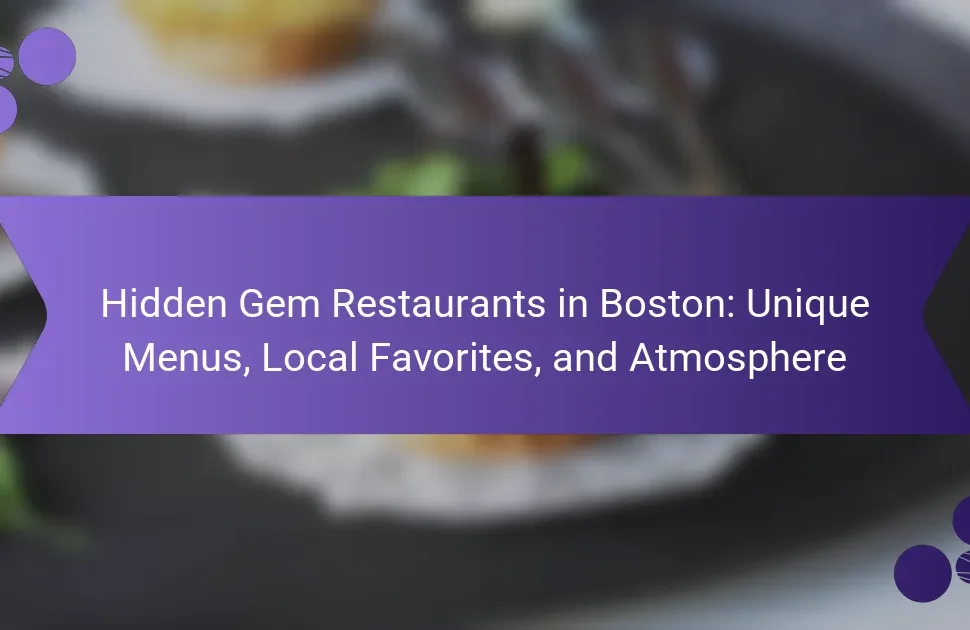
What are the Best Food Trucks in New Orleans?
The best food trucks in New Orleans include Cajun on the Bayou, serving authentic Cajun cuisine. Another popular option is La Cocinita, known for its gourmet tacos. The food truck called Dat Dog offers a variety of hot dogs with unique toppings. For seafood lovers, the Red Fish Grill truck is a must-try, featuring fresh seafood dishes. The Krewe of Chefs truck serves Creole-inspired dishes, showcasing local flavors. Each of these food trucks contributes to the vibrant street food culture in New Orleans. They are highly rated by locals and visitors alike for their unique flavors and diverse menu offerings.
How do food trucks contribute to New Orleans’ culinary scene?
Food trucks enhance New Orleans’ culinary scene by offering diverse and unique food options. They provide access to local flavors and innovative dishes. Many food trucks feature traditional New Orleans cuisine, such as gumbo and po’boys. They also introduce fusion foods that blend different culinary traditions. Food trucks promote local chefs and entrepreneurs, encouraging culinary creativity. Their mobility allows them to participate in various events and festivals, increasing visibility. According to the New Orleans Food Truck Coalition, food trucks contribute significantly to the local economy. They create jobs and stimulate food tourism, attracting visitors to the city.
What makes New Orleans a unique location for food trucks?
New Orleans is a unique location for food trucks due to its vibrant culinary culture. The city is known for its diverse food heritage, blending Creole, Cajun, and Southern cuisines. This rich gastronomic landscape encourages innovation among food truck vendors. Local festivals and events frequently feature food trucks, enhancing their visibility and popularity. The warm climate allows for year-round operation of food trucks, attracting both locals and tourists. Additionally, the city’s walkability promotes street food culture, making food trucks an accessible dining option. The presence of iconic dishes, such as gumbo and po’boys, further distinguishes the food truck scene in New Orleans.
How do food trucks reflect the city’s diverse culture?
Food trucks reflect the city’s diverse culture by offering a variety of international cuisines. They serve dishes from different cultures, showcasing the community’s ethnic diversity. For example, New Orleans food trucks feature Creole, Cajun, Vietnamese, and Mexican foods. This variety represents the city’s historical influences and immigrant populations. Additionally, food trucks often participate in local festivals celebrating cultural heritage. They create a communal dining experience that fosters cultural exchange. The vibrant food truck scene also highlights local ingredients and culinary innovation. Overall, food trucks are a dynamic expression of the city’s multicultural identity.
What types of cuisine are offered by food trucks in New Orleans?
Food trucks in New Orleans offer a diverse range of cuisines. Popular options include Cajun and Creole dishes, which reflect the city’s rich cultural heritage. Other offerings feature Southern comfort food, showcasing fried chicken and biscuits. Mexican cuisine is also prevalent, with tacos and burritos being common selections. Additionally, food trucks serve Asian-inspired dishes, such as Vietnamese pho and Japanese ramen. Seafood is a staple, particularly shrimp po’boys and gumbo. Vegan and vegetarian options are increasingly available, catering to diverse dietary preferences. This variety highlights the vibrant street food culture of New Orleans.
What are some popular food truck dishes?
Popular food truck dishes include gourmet tacos, sliders, and fusion cuisine. Tacos often feature unique fillings such as Korean BBQ or fish. Sliders are mini sandwiches that can include gourmet ingredients like truffle aioli. Fusion dishes combine elements from different culinary traditions, like sushi burritos. Street food classics like hot dogs and pretzels remain popular as well. Many food trucks also offer vegetarian and vegan options. Seasonal ingredients often influence the menu items. In cities like New Orleans, local flavors such as gumbo and po’boys are commonly found.
How do food trucks incorporate local ingredients?
Food trucks incorporate local ingredients by sourcing produce, meats, and dairy from nearby farms and markets. They often build partnerships with local suppliers to ensure freshness. This practice supports local economies and reduces transportation costs. Many food trucks feature seasonal menus that change based on ingredient availability. For example, during summer, they may use locally grown tomatoes and corn. This approach enhances the flavor and quality of their dishes. Additionally, food trucks may participate in local farmers’ markets to directly access fresh ingredients. This commitment to local sourcing reflects a growing trend in the food industry.

What are the Unique Flavors Found in New Orleans Food Trucks?
New Orleans food trucks offer a blend of unique flavors that reflect the city’s rich culinary heritage. They serve Cajun and Creole dishes, which are staples of New Orleans cuisine. Popular items include gumbo, jambalaya, and po’boys. These dishes often feature bold spices and fresh seafood. Many trucks also incorporate local ingredients like andouille sausage and crawfish. Additionally, some food trucks offer fusion cuisine, combining traditional flavors with international influences. This diversity creates a vibrant street food culture. The unique flavors are a testament to New Orleans’ history and cultural melting pot.
How do food trucks create unique flavor profiles?
Food trucks create unique flavor profiles by incorporating diverse culinary influences. They often blend traditional recipes with innovative techniques. Many food trucks source local ingredients to enhance freshness and flavor. This practice allows them to experiment with seasonal offerings. Additionally, food trucks frequently feature fusion cuisine, combining elements from different cultures. This results in distinct dishes that stand out in the culinary landscape. The mobility of food trucks enables chefs to adapt to customer preferences quickly. This responsiveness fosters creativity in menu development. Overall, their flexibility and focus on quality contribute to unique flavor experiences.
What cooking techniques are commonly used by food trucks?
Food trucks commonly use grilling, frying, and steaming as their primary cooking techniques. Grilling allows for quick cooking and enhances flavors through char. Frying is popular for items like tacos and fries, providing crispy textures. Steaming is often used for dumplings and vegetables, preserving nutrients. Many food trucks also utilize flat-top grills for versatility. These techniques cater to fast service and diverse menu items. The efficiency of these methods suits the mobile nature of food trucks.
How do regional spices influence food truck menus?
Regional spices significantly influence food truck menus by shaping flavor profiles and culinary themes. Food trucks often incorporate local spices to appeal to regional tastes. In New Orleans, spices like cayenne, paprika, and file powder are prevalent. These spices enhance traditional dishes like gumbo and jambalaya served by food trucks. The use of regional spices also attracts customers seeking authentic local cuisine. Additionally, food trucks may experiment with fusion dishes that combine regional spices with other culinary traditions. This practice creates unique menu offerings that reflect the area’s cultural diversity. Overall, regional spices play a crucial role in defining the identity of food truck menus.
Why are food trucks considered a staple of New Orleans street food culture?
Food trucks are considered a staple of New Orleans street food culture due to their diverse offerings and accessibility. They provide a variety of local and international cuisines that reflect the city’s rich culinary heritage. The vibrant atmosphere of New Orleans encourages outdoor dining and social interaction, which food trucks facilitate. Additionally, food trucks often operate at festivals and events, enhancing their visibility and popularity. The city’s unique food scene thrives on innovation, and food trucks contribute by introducing creative dishes. Their mobility allows them to reach different neighborhoods, catering to various communities. The presence of food trucks supports local entrepreneurs and fosters economic growth within the city. Overall, food trucks embody the spirit of New Orleans by blending tradition with modern street food trends.
What role do food trucks play during festivals and events?
Food trucks serve as essential vendors during festivals and events. They provide a diverse range of food options to attendees. This variety caters to different tastes and dietary preferences. Food trucks also enhance the overall festival experience by offering unique culinary flavors. Their mobility allows them to participate in various events throughout the year. According to a report by IBISWorld, the food truck industry has grown significantly, contributing to local economies. Additionally, food trucks foster social interactions, creating a vibrant atmosphere. Their presence can draw larger crowds, benefiting both the event organizers and the vendors.
How do food trucks foster community engagement?
Food trucks foster community engagement by creating accessible social spaces. They provide opportunities for local residents to gather and interact. Food trucks often participate in community events, enhancing local culture. They support local economies by sourcing ingredients from nearby vendors. This practice encourages community pride and collaboration. Additionally, food trucks often feature diverse cuisines that reflect the community’s cultural heritage. This diversity promotes inclusivity and appreciation among residents. According to a study by the National Restaurant Association, food trucks contribute to local economies and social interactions.

What are the Challenges Faced by Food Trucks in New Orleans?
Food trucks in New Orleans face several challenges. One major challenge is strict regulations and permits. Food truck operators must navigate complex city licensing requirements. Limited parking and designated zones for food trucks create logistical issues. Competition among numerous food vendors increases operational difficulties. Weather conditions, such as heavy rain or extreme heat, can impact sales. Additionally, maintaining food safety standards is critical and can be challenging in mobile setups. These factors collectively hinder the growth and success of food trucks in the area.
How do food trucks navigate regulations and permits?
Food trucks navigate regulations and permits by understanding local laws and requirements. They must obtain a business license to operate legally. Health department permits are also necessary to ensure food safety compliance. Zoning laws dictate where food trucks can park and serve customers. Many cities require specific permits for vending in public spaces. Food trucks often join local associations for support and guidance. These associations provide resources on navigating regulations effectively. Compliance with these regulations is essential for avoiding fines and interruptions in service.
What specific challenges do food trucks encounter in New Orleans?
Food trucks in New Orleans face several specific challenges. They encounter strict regulations regarding permits and zoning laws. Compliance with health and safety standards is mandatory for operation. Limited parking spaces in high-demand areas restrict their mobility. Competition with established restaurants can impact their customer base. Weather conditions, especially during hurricane season, pose operational risks. Additionally, fluctuating tourist seasons affect sales consistency. These challenges require food truck operators to adapt continuously to the local environment.
How can food truck owners overcome these obstacles?
Food truck owners can overcome obstacles by implementing strategic planning and adaptability. They should conduct thorough market research to identify customer preferences. This ensures their menu aligns with local tastes. Additionally, building strong relationships with local suppliers can enhance ingredient quality and reduce costs. Owners must also navigate regulations by staying informed about local laws and permits. Engaging with the community through social media can increase visibility and customer loyalty. Furthermore, diversifying menu offerings can attract a broader audience. According to a 2021 survey, food trucks with varied menus reported a 30% increase in sales.
What tips can enhance the food truck experience in New Orleans?
To enhance the food truck experience in New Orleans, try visiting during peak meal times. This ensures a larger selection of fresh food options. Explore different neighborhoods to discover various food truck offerings. Each area has unique flavors that reflect local culture. Engage with food truck owners to learn about their specialties. This interaction can provide insights into the best dishes available. Use social media to track food truck locations and daily specials. Many trucks post their schedules online, which can save time. Lastly, consider sharing dishes with friends to sample more options. This approach allows for a broader tasting experience.
How can customers find the best food trucks?
Customers can find the best food trucks by utilizing online resources and local recommendations. Websites like Yelp and Google Maps provide user reviews and ratings. Social media platforms also showcase food trucks and their menus. Customers can follow food truck events and festivals in their area. Local food blogs often highlight popular food trucks. Additionally, asking locals for their favorites can yield valuable insights. Many food trucks have their own websites or social media pages with schedules. Tracking these resources can help customers discover the best options available.
What are some best practices for food truck owners to thrive?
Food truck owners can thrive by focusing on quality, location, and customer engagement. Consistently offering high-quality food is essential for repeat business. Selecting prime locations with high foot traffic increases visibility and sales. Engaging with customers through social media builds a loyal following. Offering seasonal menus can attract new customers and keep the menu fresh. Collaborating with local events enhances community presence and brand recognition. Maintaining a clean and inviting truck environment is crucial for customer satisfaction. Understanding local regulations ensures compliance and smooth operations. Regularly gathering customer feedback helps improve offerings and service.
The main entity of the article is food trucks in New Orleans, highlighting their diverse menu offerings and unique flavors. The article details popular food trucks such as Cajun on the Bayou and La Cocinita, emphasizing their contributions to the city’s vibrant street food culture. It explores how food trucks enhance New Orleans’ culinary scene by providing access to local ingredients and showcasing a variety of cuisines, including Cajun, Creole, and fusion dishes. Additionally, the article addresses the challenges faced by food truck operators, such as regulations and competition, while offering tips for both customers and owners to enhance their experiences.




